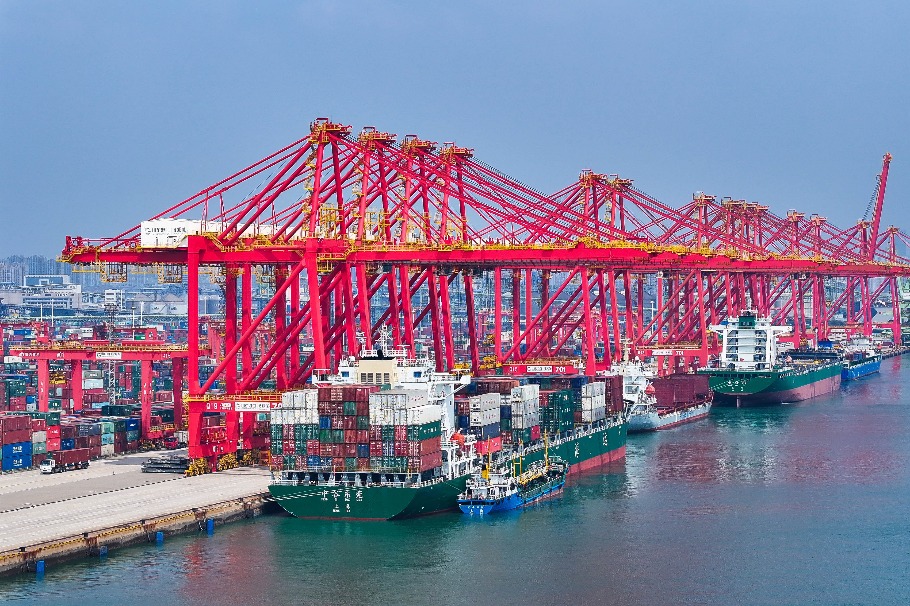State-owned firm steps up waste management, recycling


State-owned China Energy Conservation and Environmental Protection Group is stepping up efforts to promote development of solid waste handling and recycling to tap market potential of fast-growing green industries, as the country's energy efficiency and carbon intensity targets offer growth opportunities.
"CECEP will build a batch of demonstration projects in solid waste management, environmental protection, ecological conservation and resource utilization. The group will seize growth opportunities in the 14th Five-Year Plan period (2021-25), as the government sends strong signals to promote development of energy conservation and environmental protection industries," said Song Xin, chairman of CECEP.
In March, Premier Li Keqiang said China plans to reduce energy consumption per unit of GDP by 13.5 percent and carbon dioxide emissions per unit of GDP by 18 percent in the 14th Five-Year Plan period (2021-25).
In the past five years, CECEP has handled 54.23 million metric tons of solid waste, with daily processing capacity reaching 100,000 tons. The group has also tied up with the Hefei municipal government to set up an incubation platform for technical innovations in solid waste management and recycling, and research centers for organic solid waste processing in urban and rural areas, and made efforts putting research into practice, Song said.
Going forward, the group will beef up efforts innovating technologies and business models in the area, and develop a mechanism for energy efficiency, ecological conservation and environmental protection in both urban and rural areas, and introduce its experience to places in need, Song added.
China has made effective efforts and seen active progress in recycling solid waste in the past five years. According to a guideline by the National Development and Reform Commission and several other ministry-level departments, in 2019, the integral reuse rate of bulk solid waste was 55 percent, up 5 percentage points compared with that of 2015. The integral reuse rate of coal gangue, fly ash, byproduct gypsum, and straw reached 70 percent, 78 percent, 70 percent and 86 percent, respectively.
In the past five years, about 13 billion tons of bulk solid waste were recycled and reused, which saved over 66,667 hectares of land space, protected the environment and promoted high-quality development of the coal, chemical, electricity, steel and construction material sectors.
Although China saw rapid development of the solid waste management and recycling sectors, it still faces great challenges, Song said.
"Each year China produces a large amount of bulk industrial solid waste which is distributed to different places, and they have a complex mix of components which makes it hard for recycling to occur. Other challenges in managing and recycling solid waste include low utilization rates, insufficient added-value production, high costs, inadequate investment into research and development of core technologies, and excess capacity," Song added.
The guideline said that accumulated containment of solid waste in China reached about 60 billion tons, and nearly 3 billion tons of newly added bulk solid waste is produced each year. Reuse rates of waste such as bauxite residue and phosphogypsum are still relatively low. The storage of such waste not only takes up large space but also causes environmental pollution.
Facing challenges, Song suggested setting up a national online platform that shares information on managing and recycling industrial solid waste and creating a database covering key areas and industries. The goal is to offer fundamental data support to strengthen industrial solid waste management.
Song also called for efforts from companies and government to set up a demonstration area on comprehensive use of industrial solid waste which could provide reference for companies that lack experience.
Song said measures to bolster a better market environment and support technology innovation are also needed. He suggested governments set up a research fund, fully leverage technology research strengths of universities and institutes, and encourage joint efforts across the country to tackle technology barriers in major technology research and development projects, in order to continue to reduce costs associated with managing and recycling industrial solid waste, as well as find new ways to reuse industrial solid waste after processing.
The guideline has called for innovations in recycling technologies and business models, strengthening management over recycling to reuse processes, controlling newly added waste properly, increasing channels of reuse and raising added value of products made from waste.
The goal is to increase the integral reuse rate of bulk solid waste to 60 percent by 2025, reduce containment, improve the industrial system, make breakthroughs to tackle technological bottlenecks, enhance regulations and policies as well as set up more mature industry standards, according to the guideline.




































